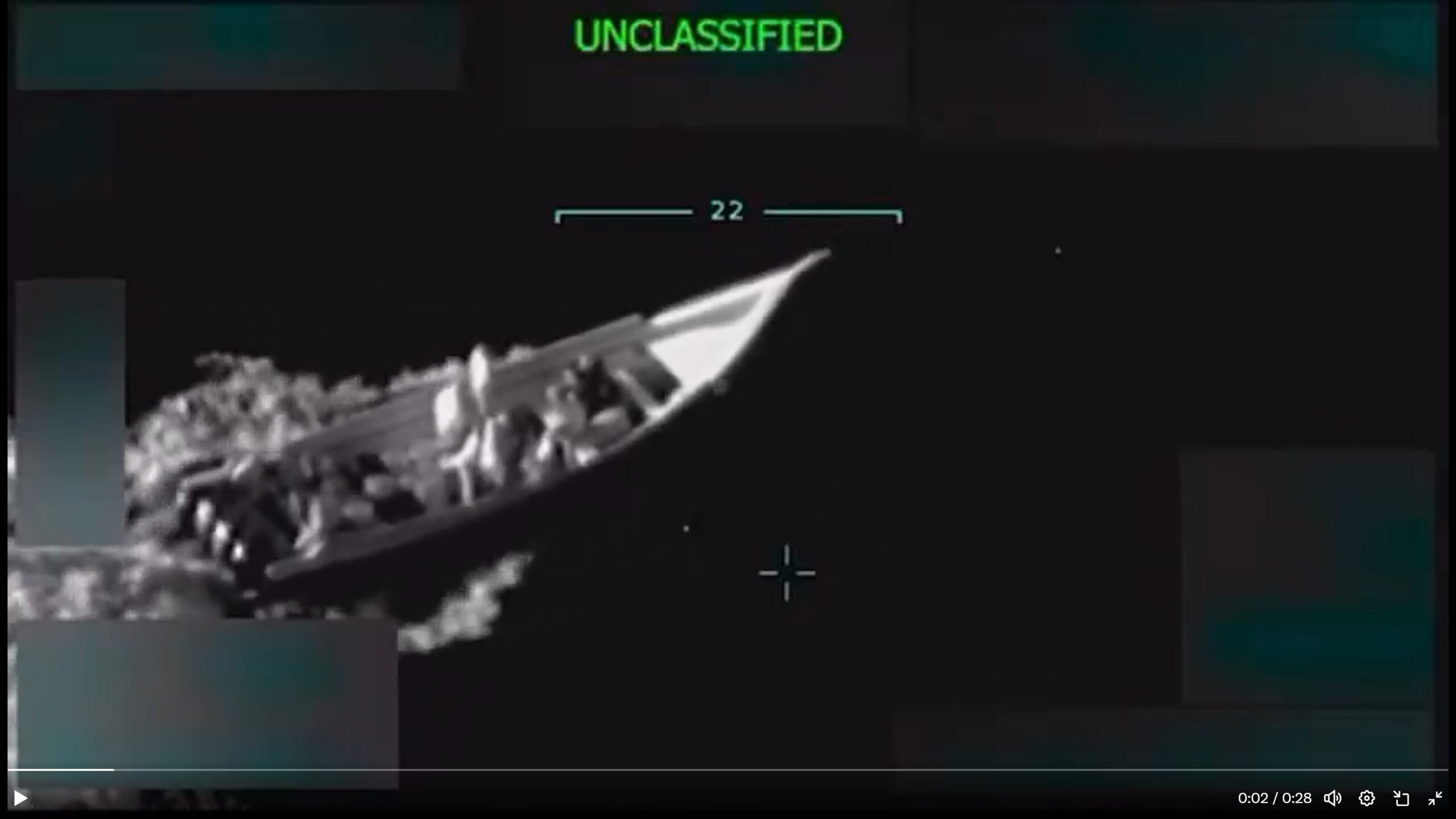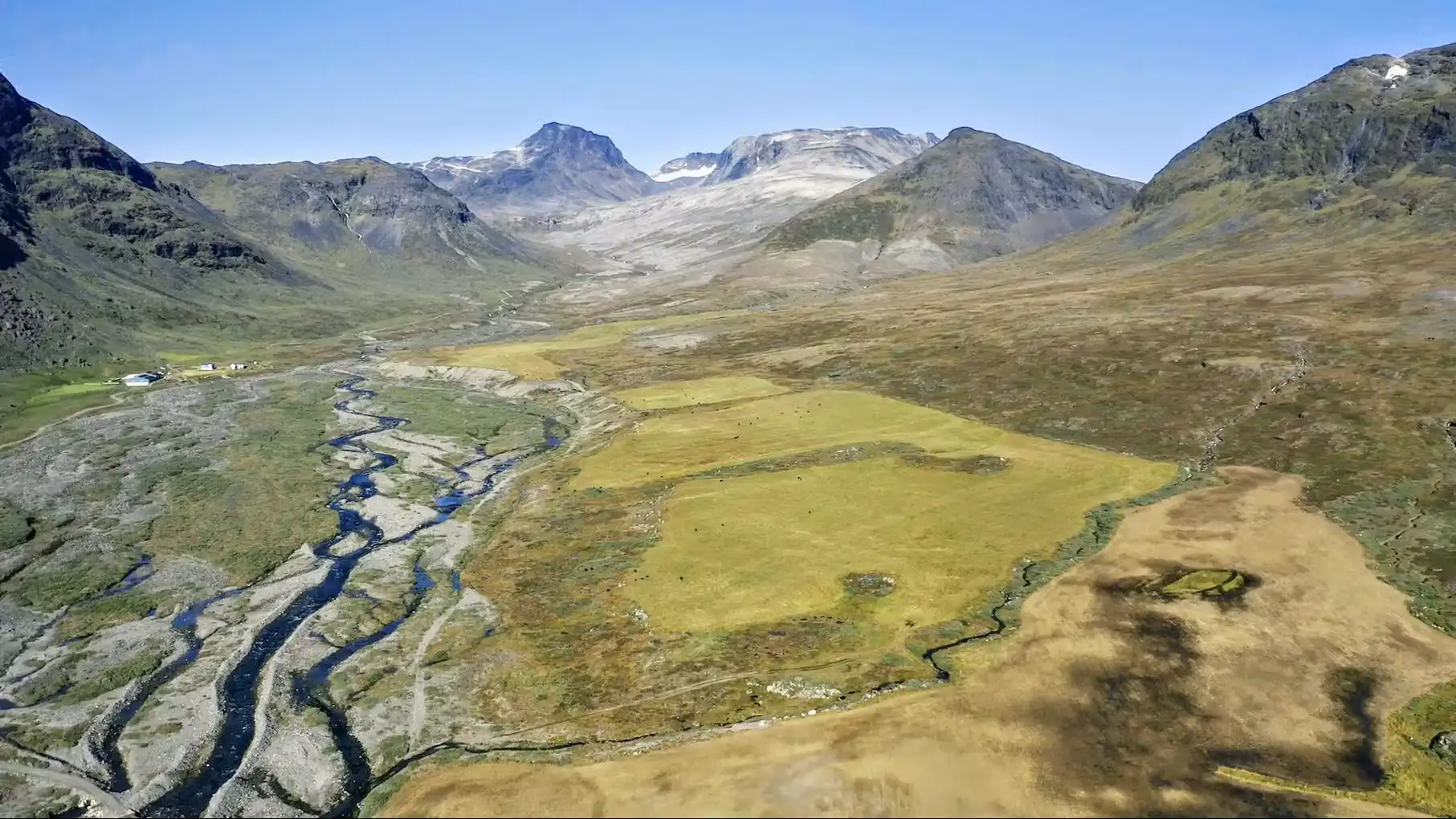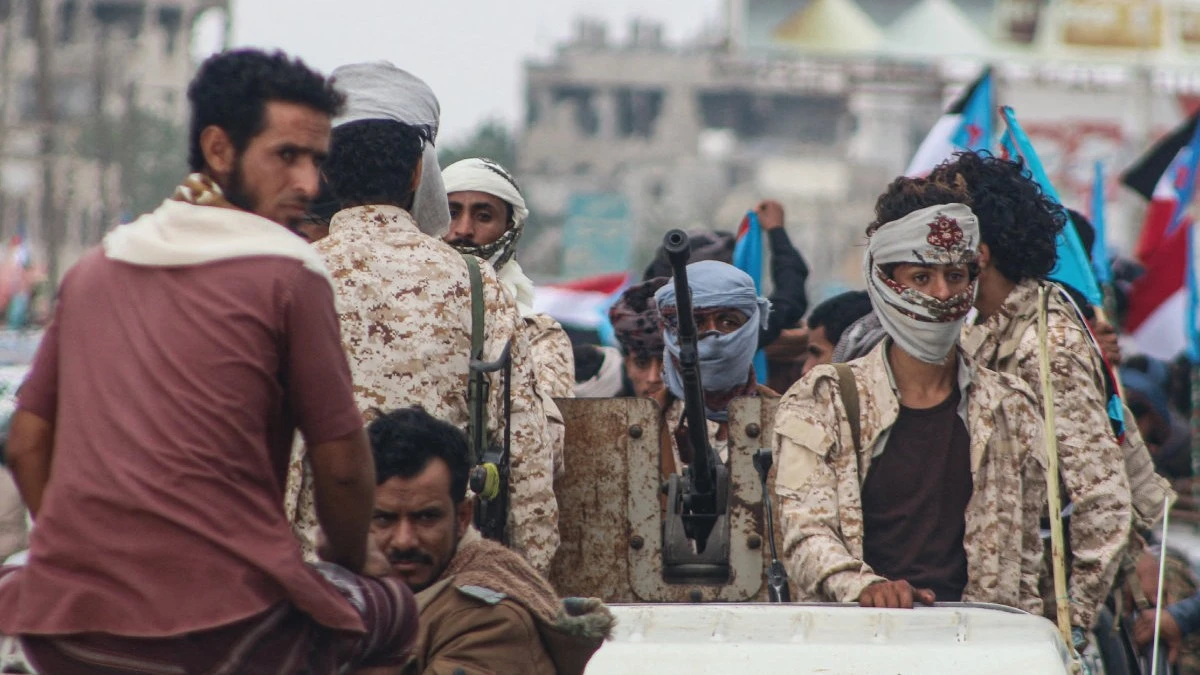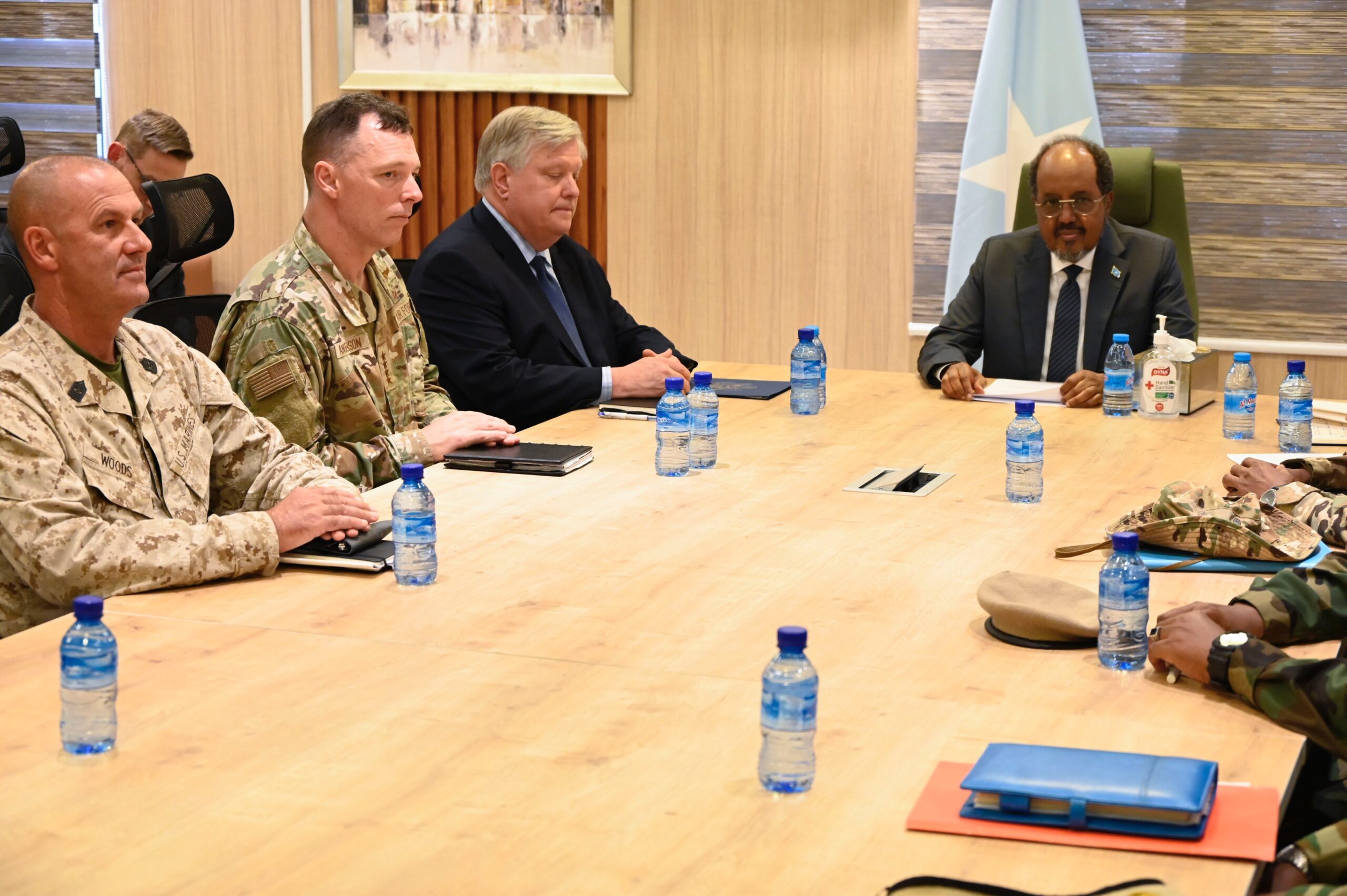On September 2nd, the US conducted an airstrike or drone bombing against an unflagged, unidentified civilian vessel which killed all 11 of those onboard. Announced by President Trump via social media, the explanation was that the crew were so-called “narcoterrorists,” that their cargo was illegal drugs, their berth was Venezuela, and their destination the US via Caribbean islands.
The bombing marked a dramatic and unsettling escalation in the recent uptick of state-led aggression against the Venezuelan regime of Nicolas Maduro, who was designated the leader of a “narcoterrorist” gang called Tren de Aragua, members of which the 11 now-deceased crewmembers of the bombed speedboat were alleged to have been.
Secretary of State Marco Rubio and Secretary of Defense Pete Hegseth were unanimous in their support for the strike, if differing a little on the details. To date, there has been no evidence presented demonstrating who the crew were, what they were doing, and where they were headed. Localized reports shed some light, but extrajudicial killings unauthorized by Congress would demand more.
President Donald Trump claimed the vessel “came out of Venezuela” and it was carrying “a lot of drugs”.
“These particular drugs were probably headed to Trinidad or some other country in the Caribbean…” Rubio told reporters on the tarmac in Mexico during a recent trip, adding that “[Trump’s] going to use the full power of America… to take on and eradicate these drug cartels”.
Hegseth stressed on Fox News that “all options will be on the table if we’re dealing with what are designated to be foreign terrorist organizations who are specifically targeting Americans on our border”.
Lethal force against a civilian vessel in international waters is a war crime if not in self-defense, which this video does not show. Only non-lethal actions, like warning shots or disabling fire, are allowed.
“Being suspected of carrying drugs” doesn’t carry a death sentence. https://t.co/6Zal0bkY9w
— Adam Isacson (@adam_wola) September 2, 2025
It was back in February that State first designated 8 South American groups, including Tren de Aragua, as foreign terrorist organizations (FTO) and have since taken to calling them “narcoterrorists,” which Elon Musk, who was then often within earshot of the President, explained on X meant they could be targeted in drone strikes. Legal experts are substantially doubtful of whether or not such action is permitted under the laws of war, or Article II of the Constitution.
El Pitazo, claimed that 8 of the 11 crewmembers came from the small village of San Juan de Unare, the residents of which have filled social media with memorials to their dead kinsmen. The report further claimed that two other boats “loaded with drugs” left the same town and passed by undetected where the vessel was bombed, contrary to Trump’s boasting that other traffickers would think twice before attempting the same.
As for Trinidad and Tobago, the boat was allegedly 65 miles beyond the islands. Prime Minister Kamla Persad-Bissessar is supposed to have cheered the bombing, saying “kill them all violently,” a remark which the Trinidad Express said has unsettled fisherfolk and civil society groups.
Venezuela Analysis states that Tren de Aragua was a regional gang that started in a prison and its operations inside Venezuela were dismantled in a raid in 2023.
Narco-trafficking is a well-established activity under international prosecutorial standards, but the idea of a “narcoterrorist” is a new concept. The Western Hemisphere has struggled to suffocate the power of drug cartels for more than 40 years, and that history bears out that their power is linked to the profits they make selling narcotics. Narcoterrorism implies, one supposes, that the narcotics are being used to commit politically-motivated violence intended to spread fear and make headlines; a motive far more suitable to the traditional terrorist instruments of bombs and guns.
An unsettling action
Venezuela Analysis was responding to allegations from Washington shortly after the strike occurred.
“According to the latest UN World Drug Report, Venezuela is neither a major drug producer nor a key trafficking corridor to the US. The UN data corroborates the most recent [US] Drug Enforcement Administration report, which states that less than 10% of US-bound cocaine flows through Venezuela and the Eastern Caribbean corridor,” the outlet wrote.
Brian Finucane, former legal advisor to the US State Dept. and a Non-Resident Senior Fellow at the Reiss Center on Law and Security at NYU School of Law, described the bombing in a legal review at the foreign policy think tank Just Security as an “extraordinary and unsettling action”.
“[T]here is no plausible argument under which the principle legal authority for the US so-called “war on terror”—the 2001 Authorization for the Use of Military Force—authorizes military action against the Venezuelan criminal entity Tren de Aragua”.
“Further, though Trump and others in his administration have emphasized the prior designation of Tren de Aragua as an FTO, such designation does not by itself convey authority to use force,” he added, noting that an FTO designation is “widely and mistakenly perceived as authorizing such action within the executive branch”.
“Thus, designation of Tren de Aragua and a number of other Latin American criminal entities as FTOs in February foreshadowed this week’s attack in the Caribbean, despite providing no actual legal authority for it”.
Indeed, Finucane suspected that if pressed, the Oval Office would claim the President was utilizing his Article II powers as Commander-in-Chief of the military to respond to an “imminent threat,” but not only was the ship in international waters, nowhere near the US—and allegedly not even heading to the US according to Rubio—but was also not posing a threat, as narco-trafficking is not a military action.
“Being suspected of carrying drugs doesn’t carry a death sentence,” wrote Adam Isacson of the Washington Office on Latin America (WOLA), a sharp critic of the Maduro regime. “Lethal force against a civilian vessel in international waters is a war crime if not in self-defense, which this video does not show. Only non-lethal actions, like warning shots or disabling fire, are allowed”.
The Venezuelan regime for its part hypothesized that the video was generated by AI. Neither Caracas nor Washington has provided any information about the flag of the vessel, whether it had a transponder activated, or any other information that related to the nationality of the sailors, as a result, the strike may not have been illegal under the UN Charter’s prevention of using force against other states.
On the other hand, no information was provided showing that all 11 members of the crew were engaged in narcoterrorism activities. Killing all onboard without having this information is a war crime under US and international law. Rubio stated that there was no attempt by the US Coast Guard to intercept the vessel and arrest the criminals on board because the President declined that option which was made available to him. He opted for bombing, which Finucane interpreted as sending American forces into battle, and thus requisite to the War Powers Act of Congress, which mandates the President must request the authority from Congress before doing just that.
Maduro himself didn’t waste his breath on questions of legality, saying simply “they want our oil for free,” at a recent public speech. 8 US warships and 4,000 sailors are currently stationed in the southern Caribbean near Venezuela. WaL
We Humbly Ask For Your Support—Follow the link here to see all the ways, monetary and non-monetary.
PICTURED ABOVE: The alleged narcoterrorism boat before it was destroyed by US air power. PC: Screengrab.



